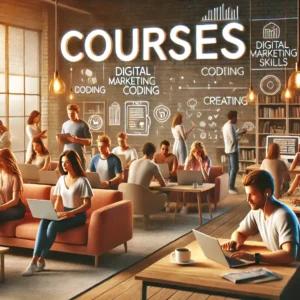In today’s fast-changing world, continuous learning is the key to staying competitive. Courses, both traditional and online, play a pivotal role in skill-building, offering individuals the chance to upgrade their expertise or explore new fields. Whether it’s for career advancement, personal development, or pursuing a passion, courses provide a structured pathway to knowledge.
The advent of online courses has revolutionized education by making learning more flexible and accessible. From acquiring technical expertise through a digital marketing course to exploring creative hobbies, the range of available courses caters to diverse interests and goals.
What Are Courses?
Courses are structured programs designed to teach specific skills or knowledge in a particular field. They can vary in duration, format, and complexity, catering to the needs of learners from all backgrounds.
Purpose of Courses
- Skill Enhancement: Gaining new abilities to stay relevant in the workforce.
- Professional Development: Acquiring certifications to advance your career.
- Personal Growth: Exploring interests and hobbies in a guided environment.
Types of Courses
Courses are as diverse as the learners they serve. Below are the main categories:
1. Academic Courses
These courses are foundational and often pursued in schools, colleges, or universities. They focus on subjects like mathematics, science, and humanities.
2. Professional Skill Development Courses
Designed to enhance workplace skills, these courses focus on areas like management, leadership, and technology. A digital marketing course, for instance, is a popular choice among professionals seeking to expand their digital expertise.
3. Certification Courses
Certification courses are short-term programs that offer recognized credentials. They’re ideal for validating skills in fields like IT, healthcare, or marketing.
4. Hobby and Recreational Courses
From photography to cooking, these courses allow learners to explore personal interests and relax while developing new talents.
The Evolution of Courses
Traditionally, courses were confined to physical classrooms. Learners had to adhere to fixed schedules, which often posed challenges for working professionals or those living in remote areas. However, the rise of online courses has transformed this dynamic.
Benefits of Online Courses
- Flexibility: Learn at your own pace, anytime and anywhere.
- Accessibility: Gain access to high-quality education regardless of location.
- Variety: From professional development to creative hobbies, there’s something for everyone.
For example, a digital marketing course taken online can equip learners with in-demand skills while fitting into their busy lives.
Courses have evolved to meet the needs of modern learners, bridging gaps in education and skill-building. With the abundance of options available, it’s easier than ever to find a program that aligns with your goals. Whether you prefer traditional settings or the convenience of online courses, the right choice can propel you toward success in any field.
Are you prepared to advance in your learning journey? Explore courses that match your interests and aspirations today!
Benefits of Taking Courses
Courses, both traditional and online, offer numerous advantages for learners across all stages of life. Here are the key benefits:
1. Personal and Professional Growth
Courses enable individuals to develop skills and acquire knowledge that can transform their personal and professional lives. Whether you’re improving your technical expertise or pursuing a new hobby, the learning process boosts confidence and competence.
2. Career Advancement
One of the most notable benefits of courses is their ability to open doors to new career opportunities.
- Certifications earned through programs like a digital marketing course or IT-related courses demonstrate your expertise to potential employers.
- Professionals can gain specialized qualifications to move up the career ladder or pivot to a new industry.
3. Flexibility of Online Courses
Online courses are especially appealing due to their flexibility. Learners can:
- Study at their own pace.
- Access course materials 24/7.
- Balance learning with work and family commitments.
This adaptability makes online education a popular choice for working professionals and those with busy schedules.
4. Affordability and Accessibility
Online courses are typically more budget-friendly than traditional classroom programs, making them a cost-effective alternative.
- No travel or relocation expenses.
- A variety of free or low-cost programs are available, making education more accessible to all.
- Learners from remote areas can enroll in high-quality programs without geographical limitations.
5. Networking Opportunities
Taking courses—particularly online programs—provides opportunities to connect with instructors and peers from around the world.
- Develop professional relationships with industry experts.
- Join online communities to share insights and collaborate on projects.
Networking through courses can be instrumental in building your career and gaining exposure to diverse perspectives.
Types of Online Courses
The diversity of online courses ensures there’s something for everyone, from budding entrepreneurs to seasoned professionals. Let’s dive into some of the top categories to consider:
1. Digital Marketing Courses
What They Cover
Digital marketing courses are tailored to teach:
- Search Engine Optimization (SEO)
- Pay-Per-Click Advertising (PPC)
- Social Media Marketing (Facebook, Instagram, LinkedIn, etc.)
- Content Marketing and Email Marketing
Benefits for Aspiring Marketers and Entrepreneurs
- Equip yourself with skills to run successful marketing campaigns.
- Learn to grow your business’s online presence effectively.
- Gain insights into analytics and ROI-driven strategies.
Best Platforms Offering Digital Marketing Courses
- Google Digital Garage: Free and beginner-friendly.
- HubSpot Academy: Offers certifications in inbound marketing.
- Coursera: Professional certifications from institutions like the University of Illinois.
2. Technology and Programming Courses
Examples
- Python
- Artificial Intelligence (AI)
- Data Science and Machine Learning
Impact on Careers in Tech
- Gain skills for high-demand roles like data analyst, AI engineer, or software developer.
- Stay competitive in the rapidly evolving tech industry.
- Popular platforms like Udemy and edX provide hands-on learning opportunities.
3. Creative Skills Courses
Popular Creative Fields
- Graphic Design
- Video Editing
- Creative Writing
Why Choose Creative Courses?
- Foster innovation and self-expression.
- Learn industry-standard tools and techniques, such as Adobe Photoshop or Final Cut Pro.
- Platforms like Skillshare and Udemy specialize in creative skills, offering project-based learning experiences.
4. Personal Development Courses
Core Topics
- Public Speaking
- Time Management
- Leadership Skills
Who Benefits?
- Professionals looking to excel in their careers.
- Individuals seeking to improve personal effectiveness and interpersonal skills.
Personal development courses focus on building qualities that drive success in both personal and professional settings.
How to Choose the Right Course for You
1. Assess Your Goals

Before selecting a course, identify your objectives:
- Academic Improvement: Are you looking to boost grades or gain admission to a university?
- Professional Certification: Do you want to earn credentials like those offered in a digital marketing course?
- Personal Interests: Are you exploring a hobby or creative skill for personal fulfillment?
Understanding your goals ensures you choose a course aligned with your ambitions.
2. Research Course Providers
The provider plays a significant role in the quality of your learning experience. Compare:
- Traditional Institutions: Offer in-depth, accredited programs with structured schedules.
- Online Platforms: Provide flexibility, affordability, and access to global instructors.
For instance, if you want to learn SEO or PPC, a digital marketing course from platforms like Coursera or Udemy might be ideal.
3. Accreditation and Credibility
Accreditation adds value to your qualifications. Look for:
- Courses affiliated with recognized universities or organizations.
- Certifications that are widely accepted by employers.
For example, edX partners with top universities to offer accredited online courses that enhance your resume.
4. Read Reviews and Testimonials
Feedback from previous learners offers valuable insights:
- Learn about course content, instructor quality, and platform support.
- Compare platforms based on online course reviews to find the best fit.
Platforms like Skillshare and Udemy have transparent review systems that help you make informed decisions.
5. Free vs. Paid Courses
Consider your budget and desired outcomes:
- Free Courses: Ideal for exploring a subject or gaining introductory knowledge.
- Paid Courses: Often provide in-depth learning, certifications, and better support.
For example, Google Digital Garage offers free digital marketing lessons, while paid options on Coursera provide certifications recognized by employers.
Top Platforms for Online Courses in 2025
With numerous platforms offering online courses, it’s essential to know what each one excels at. Here’s a breakdown of the best course platforms to consider:
1. Coursera
- Strengths:
- Partners with leading universities and companies.
- Offers professional certificates, degrees, and specializations.
- Popular Courses:
- Digital Marketing Specialization by the University of Illinois.
- Data Science programs by IBM.
- Pricing:
- Free auditing options available.
- Paid plans starting at $39/month for certificates.
2. edX
- Strengths:
- Collaborates with universities like Harvard and MIT.
- Allows free auditing of courses with an option to purchase certificates.
- Popular Courses:
- Computer Science for Artificial Intelligence.
- MicroMasters programs for professional advancement.
- Who It’s For:
- Learners seeking accredited programs or university-level education.
3. Udemy
- Strengths:
- Affordable and extensive catalog of courses.
- Lifetime access to purchased courses.
- Popular Courses:
- Digital marketing course for beginners.
- Python programming for all levels.
- Pricing:
- Frequent discounts make courses accessible, often as low as $10.
4. LinkedIn Learning
- Strengths:
- Focused on professional development and career skills.
- Integration with LinkedIn profiles to showcase certificates.
- Popular Courses:
- Time management and productivity.
- Project management essentials.
- Subscription Model:
- Monthly plans starting at $19.99.
5. Skillshare
- Strengths:
- Specializes in creative and artistic courses.
- Offers project-based learning and community interaction.
- Popular Courses:
- Graphic design and video editing.
- Creative writing and photography.
- Pricing:
- Subscription-based, starting at $32/month with a free trial option.
Deep Dive Into Digital Marketing Courses
What Is a Digital Marketing Course?
A digital marketing course is a structured program designed to teach the strategies and tools required to promote products or services online. These courses cover various aspects of online marketing, making them ideal for beginners and experienced marketers alike.
Key Modules in a Digital Marketing Course
- Search Engine Optimization (SEO): Learn how to optimize websites to rank higher in search engine results.
- Search Engine Marketing (SEM): Understand paid advertising strategies, such as Google Ads.
- Social Media Marketing: Master platforms like Facebook, Instagram, and LinkedIn to engage audiences.
- Email Marketing: Learn to craft effective email campaigns to nurture leads and drive sales.
By completing these modules, learners gain a comprehensive understanding of how to drive traffic, generate leads, and boost conversions.
Why Take a Digital Marketing Course?
1. Growing Demand for Digital Skills
The shift toward online business has created a significant demand for digital marketing professionals. Companies across industries are looking for experts who can help them succeed in the digital space.
2. Potential ROI for Entrepreneurs and Job Seekers
- Entrepreneurs: A digital marketing course can help business owners maximize their marketing budget, improve brand visibility, and increase revenue.
- Job Seekers: With certifications in digital marketing, professionals can enhance their resumes and secure higher-paying roles.
Investing in a digital marketing course is not just about learning new skills; it’s about opening doors to a successful career or thriving business.
Top Digital Marketing Courses in 2025
1. Google Digital Garage
- Strengths: Free and beginner-friendly.
- Topics Covered: Fundamentals of digital marketing, including SEO and SEM.
2. HubSpot Academy
- Strengths: Offers certifications in inbound marketing and content strategy.
- Ideal For: Professionals looking to specialize in content-driven marketing.
3. Coursera’s Digital Marketing Specialization
- Strengths: Taught by leading universities, with flexible deadlines.
- Modules: SEO, social media, and analytics tools.
These platforms offer top-notch programs to help you learn digital marketing and apply it in real-world scenarios.
Challenges of Taking Courses and How to Overcome Them
While taking courses offers immense benefits, it’s not without its challenges. Here are strategies to address the most frequent challenges:
1. Time Management
Balancing online courses with work, family, or other commitments can be daunting.
Tips to Manage Time Effectively

- Create a dedicated study schedule.
- Break lessons into smaller, manageable chunks.
- Use productivity tools like Trello or Google Calendar to stay organized.
By planning ahead, you can complete your coursework without feeling overwhelmed.
2. Overwhelming Choices
With so many courses available, deciding which one to take can be stressful.
How to Filter and Prioritize Courses
- Identify Your Goals: Focus on courses aligned with your career or personal aspirations.
- Research Providers: Compare reviews and ratings on platforms like Udemy or Coursera.
- Test Free Options First: Platforms like Google Digital Garage allow you to explore the basics before committing to paid courses.
Prioritizing based on your needs and goals will help you find the right fit.
3. Lack of Motivation
Staying committed to an online course can be challenging, especially without external accountability.
Strategies for Staying Engaged
- Set clear milestones and reward yourself for achieving them.
- Join online communities or forums to interact with fellow learners.
- Visualize the end result, whether it’s landing a new job or mastering a skill.
With these strategies, you can overcome the barriers to completing your courses successfully.
Future Trends in Courses and Online Learning
1. AI-Powered Learning
Artificial intelligence (AI) is revolutionizing education by tailoring content to individual learners.
How AI Enhances Courses
- Personalized Recommendations: AI analyzes learning patterns and suggests courses that match interests and goals.
- Adaptive Learning Platforms: Tools like Duolingo adjust difficulty levels based on your progress, ensuring a customized experience.
For example, if you’re interested in SEO, an AI-powered platform might recommend a digital marketing course with a focus on SEO strategies.
2. Virtual Reality and Augmented Reality in Education
Immersive technologies like VR and AR are transforming online learning into interactive experiences.
Applications in Courses
- Virtual Labs: Medical students can practice surgeries in a simulated environment.
- AR for Creative Skills: Learn graphic design or video editing with 3D visualizations.
These innovative technologies connect theoretical concepts with real-world applications, enhancing engagement and the overall learning experience.
3. Micro-Credentials and Nano-Degrees
The demand for short, targeted learning programs is on the rise.
What Are Micro-Credentials and Nano-Degrees?
- Micro-Credentials: Bite-sized certifications focused on specific skills, like coding or marketing analytics.
- Nano-Degrees: Comprehensive programs for specialized fields, often offered by platforms like Udacity.
Why They’re Popular
- Quick to complete compared to traditional degrees.
- Highly focused on industry-relevant skills.
For instance, a nano-degree in digital marketing equips learners with expertise in PPC, SEO, and content marketing within a few months.
4. Global Collaboration Opportunities
Online courses connect learners and educators from around the world.
Benefits of Global Collaboration
- Exchange diverse perspectives in virtual classrooms.
- Participate in group projects with international peers.
- Build a global professional network.
This interconnected approach enriches the learning experience, preparing students for success in a globalized world.
Comprehensive FAQ Section
1. What are the most popular online courses in 2025?
Trending topics include AI, coding, and digital marketing courses. These areas align with current job market demands, making them highly sought after.
2. Are online courses worth it?
Yes! Online courses provide flexibility, affordability, and accessibility. They’re an excellent way to gain skills without disrupting your schedule, and certifications often boost employability.
3. What steps should I take to select the ideal course for my career?
Consider:
- Your Goals: Identify whether you’re seeking professional growth, personal development, or academic improvement.
- Reviews: Look for positive feedback from previous learners.
- Accreditation: Verify that the course meets recognized industry standards.
4. Can I get a job after completing an online course?
Absolutely. Many employers value certifications from reputable platforms, especially in fields like digital marketing, data analysis, and programming.
5. What is the difference between free and paid online courses?
- Free Courses: Often introductory with limited features and no certification.
- Paid Courses: Provide comprehensive content, instructor support, and recognized certifications.
6. How long do digital marketing courses usually take?
A digital marketing course can range from a few weeks to six months, depending on the depth and platform. For example, Google Digital Garage offers short-term lessons, while Coursera provides extensive specializations.
7. Which platform is best for creative courses?
- Skillshare: Focused on creative skills like graphic design and photography.
- Domestika: Offers specialized courses in arts and crafts.
- Udemy: Provides a broad catalog of affordable creative programs.
8. How do I stay motivated while taking an online course?
- Set clear milestones.
- Join online communities for accountability.
- Reward yourself for completing modules or lessons.
9. What are nano-degrees, and are they recognized?
Nano-degrees are concise, targeted programs designed to develop specific skills required for particular job roles. They are often recognized by employers, especially in tech fields like data science or digital marketing.
10. Can I access online courses on mobile devices?
Yes, most platforms are mobile-friendly. Apps like Coursera, Udemy, and LinkedIn Learning allow you to learn on the go.
The future of courses lies in innovation, accessibility, and relevance. Trends like AI-powered learning, immersive VR experiences, and globally recognized nano-degrees are transforming education. These developments make it easier than ever to acquire skills in fields like digital marketing, coding, and creative arts.
Whether you’re looking to enhance your career or explore a new passion, online courses provide unparalleled opportunities for growth. Take the first step today by enrolling in a course that aligns with your goals and unlock your potential!







